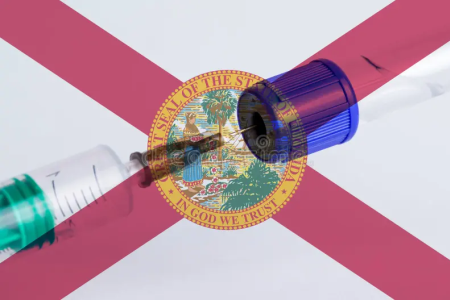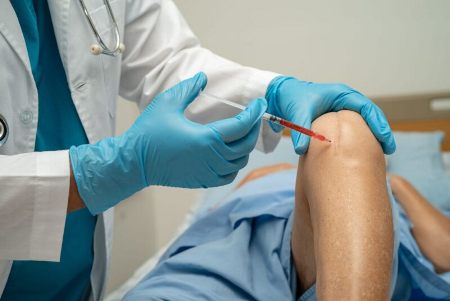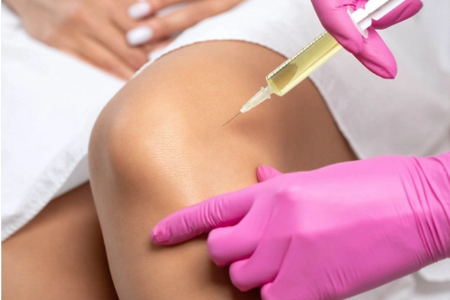当前位置
Florida Stem Cell Law Flaunts the FDA
 Florida is the latest state, joining Nevada and Utah, to pass state regulations which “allow” stem cell therapies that are not approved by the FDA. In principle, federal law always takes precedence over state law, and regardless of what the state approves these therapies remain illegal. In practice, given the current circumstances of the FDA and the US federal government, the new Florida regulations will probably not be challenged in the foreseeable future.
Florida is the latest state, joining Nevada and Utah, to pass state regulations which “allow” stem cell therapies that are not approved by the FDA. In principle, federal law always takes precedence over state law, and regardless of what the state approves these therapies remain illegal. In practice, given the current circumstances of the FDA and the US federal government, the new Florida regulations will probably not be challenged in the foreseeable future.
The Florida regulations were presented in two companion bills, on both sides of the Florida legislature: Senator Jay Trumbull sponsored Senate Bill 1768, and Representative James Buchanan sponsored House Bill 1617. The bills went through two rounds of revisions in committee, and the final version is enrolled as SB 1768. Upon receiving the Governor’s signature, the new Florida regulations will take effect 1 July 2025.
It is worthwhile to dive into the exact wording of this bill to see what it says versus what topics it does not address. Florida SB1768 is “authorizing physicians to perform stem cell therapy not approved by the United States Food and Drug Administration under certain circumstances”.
- The patient must always sign an informed consent which advises that the stem cell therapy is “not yet” approved by the FDA.
- The person performing the therapy must be a licensed physician (M.D. or D.O.), and must be performing a procedure within the scope of their practice. Furthermore, allowed procedures are limited to cell therapies for orthopedics, wound care, and pain management.
- The source of the stem cells… is not clearly specified in the final language. The bill is “encouraging the use of stem cell sources such as adult stem cells, umbilical cord blood, and other ethically obtained human cells, tissues, or cellular or tissue-based products”
- The allowed human cell sources do not include bone marrow, blood vessels, or organs that are intended for transplantation. Allowed sources do not include “ancillary products used in the manufacture of human cells”, which implicitly excludes exosome and secretome products.
- The bill prohibits the use of cells or tissues “derived from a fetus or embryo after an abortion”. This bill classifies the use of embryonic sources as a “felony of the third degree”.
- The bill says nothing, one way or the other, about whether the cells may be cultured in the laboratory to expand their number. Culturing is a standard step towards producing mesenchymal stromal cells (MSC) for therapeutic applications. Presumably, since culturing is not prohibited, it is allowed.
- Ironically, despite the ways in which this bill flaunts the FDA, it nonetheless requires that the stem cells must be “retrieved, manufactured, and stored in a facility that is registered and regulated by the United States Food and Drug Administration”.
- Moreover, there is some logical contradiction in the bill’s requirement that the cell manufacturing facility must follow cellular good manufacturing practices (cGMP) pursuant to FDA regulations spelled out in the Code of Federal Regulations (CFR1271). The contradiction lies in the fact that CFR1271 only allows cell manufacturing with minimal manipulation and for homologous use, which are exactly the restrictions that the Florida law is designed to break.
- The bill further stipulates that the facility must be "accredited" by one of four entities: NMDP, WMDA, AABB, or AATB. Both NMDP and WMDA are transplant registries; only AABB and AATB are accreditation agencies.
- The treating physician must receive a “post-thaw viability analysis report for the product lot” to ensure that the therapy contains live cells. We will return to this.
- But… the physician does not have to comply with the above if they are employed by “an entity with expertise in stem cell therapy as determined by the department”.
The language of this Florida bill is in many ways much more rational and conservative than a Utah state bill “legalizing” placental tissue therapy which became law on 1 May 2024. Sponsors of the Utah bill managed to sneak it through the state legislature with no discussion whatsoever, whereas the two proposed Florida bills were subjected to rounds of lobbying and revisions. However, both the Utah and Florida bills contain a wild card where all the stipulated rules can be broken if the state department of health says it is OK. Here is a table that compares and contrasts the state-level cell therapy regulations in Utah and Florida:
Features | Utah 2024 SB199 | Florida 2025 SB1768 |
Must the patient be told the cell therapy is not FDA approved? | Not if the provider works for an accredited cell supplier. | Always, patient must sign informed consent. |
Who can give cell therapy? | Health Care Provider | Licensed Physician operating within scope of practice |
Allowed Indications | Any | orthopedics, wound care, and pain management |
Included Cell Sources | Placental stem cells | Adult stem cells |
Excluded Cell Sources | None named | Embryonic stem cells |
Must the cells come from an accredited facility? | No | Yes. Accreditation options: |
Must the cells be checked for viability? | No | Yes |
Are employees of certain institutions exempt from these rules? | Yes. Employees of institutions accredited by: | Yes. Employees of institutions accredited by: |
Ultimately, The Florida law gives the state Dept. of Health the final authority to regulate which institutions have to follow what rules for handling products made of human cells and tissues (HCT/Ps) – a function which is normally reserved for the FDA.
 In a 2021 survey of US businesses that sell unlicensed stem cell interventions, Florida emerged as the state with the highest number of clinics per capita. Hence it is not surprising that many interested parties lobbied the Florida legislature in support of SB1768. The bill was opposed by Florida clinics which specialize in procedures that are already legal under federal law: these are same-day treatments with the patient’s own unmanipulated bone marrow (BMAC) and/or platelet-rich plasma (PRP). Those clinics previously had a legal advantage. Also, the delivery of same-day therapies requires that the patient must visit the clinic twice in one day: in the morning for the harvest and a few hours later for the therapy. Same-day cell therapy will now be at a logistical disadvantage against clinics offering off-the-shelf products made from allogeneic cord blood or MSC, etc., which can be delivered in one visit. On the flip side, the same-day clinics in Florida can now take advantage of the permissive new law to expand their client’s cells in culture and offer them a variety of manipulated cell products made with their own cells and stored for use off-the-shelf.
In a 2021 survey of US businesses that sell unlicensed stem cell interventions, Florida emerged as the state with the highest number of clinics per capita. Hence it is not surprising that many interested parties lobbied the Florida legislature in support of SB1768. The bill was opposed by Florida clinics which specialize in procedures that are already legal under federal law: these are same-day treatments with the patient’s own unmanipulated bone marrow (BMAC) and/or platelet-rich plasma (PRP). Those clinics previously had a legal advantage. Also, the delivery of same-day therapies requires that the patient must visit the clinic twice in one day: in the morning for the harvest and a few hours later for the therapy. Same-day cell therapy will now be at a logistical disadvantage against clinics offering off-the-shelf products made from allogeneic cord blood or MSC, etc., which can be delivered in one visit. On the flip side, the same-day clinics in Florida can now take advantage of the permissive new law to expand their client’s cells in culture and offer them a variety of manipulated cell products made with their own cells and stored for use off-the-shelf.
Nationally, the leading provider of same-day BMAC therapy with your own cells is a chain of clinics under the brand name Regenexx. Back in 2010, they fought a lawsuit over the FDA policy that your own cells should be treated as drugs, and they ultimately lost, which forced them to move their expanded cell products off-shore. Since then, regulatory law has changed drastically. The FDA’s discretion to set policy was restricted by the SCOTUS Chevron decision in June 2024. Starting in July 2025, Florida will no longer treat expanded cells as drugs, whether they are your own cells or someone else’s.
 It will be very interesting to see how the Florida Dept. of Health implements the requirement for a “post-thaw viability analysis report for the product lot”. Scientifically, there is a decades old problem in the stem cell field that there is no such thing as a quick test to count live stem cells. Clinicians that administer stem cell therapies often ignore that fundamental truth and rely on tests like flow cytometry which can quickly count cells, even though there is no proof that the cells are alive. If the Florida Dept. of Health is serious about testing viability, they will have to require cultures of product lots, running several days to a week, to see if the lot contains live cells that grow in culture. In the case of umbilical cord blood, each bag of donated blood is a separate product lot, and viability testing would have to be performed on one of the testing segments in the tubing attached to the blood bag.
It will be very interesting to see how the Florida Dept. of Health implements the requirement for a “post-thaw viability analysis report for the product lot”. Scientifically, there is a decades old problem in the stem cell field that there is no such thing as a quick test to count live stem cells. Clinicians that administer stem cell therapies often ignore that fundamental truth and rely on tests like flow cytometry which can quickly count cells, even though there is no proof that the cells are alive. If the Florida Dept. of Health is serious about testing viability, they will have to require cultures of product lots, running several days to a week, to see if the lot contains live cells that grow in culture. In the case of umbilical cord blood, each bag of donated blood is a separate product lot, and viability testing would have to be performed on one of the testing segments in the tubing attached to the blood bag.
Although the new Florida law sweeps away many restrictions for cell therapy manufacturers based in Florida, it does not protect outside manufacturers who ship their products into Florida. When biologic products travel between states, they are subject to federal FDA regulations. Interstate commerce can also be subject to prosecution by the Federal Trade Commission (FTC). Thus, the Florida law is primarily a boon for cell therapy laboratories and clinics located within Florida.
For now, the new Florida law only allows adult stem cell therapy for diagnoses that fall under the categories of “orthopedics, wound care, and pain management”. But the next session of the Florida legislature begins in early 2026. There is always the possibility that the Florida legislature may consider broadening the indications for use… so stay tuned for updates!


